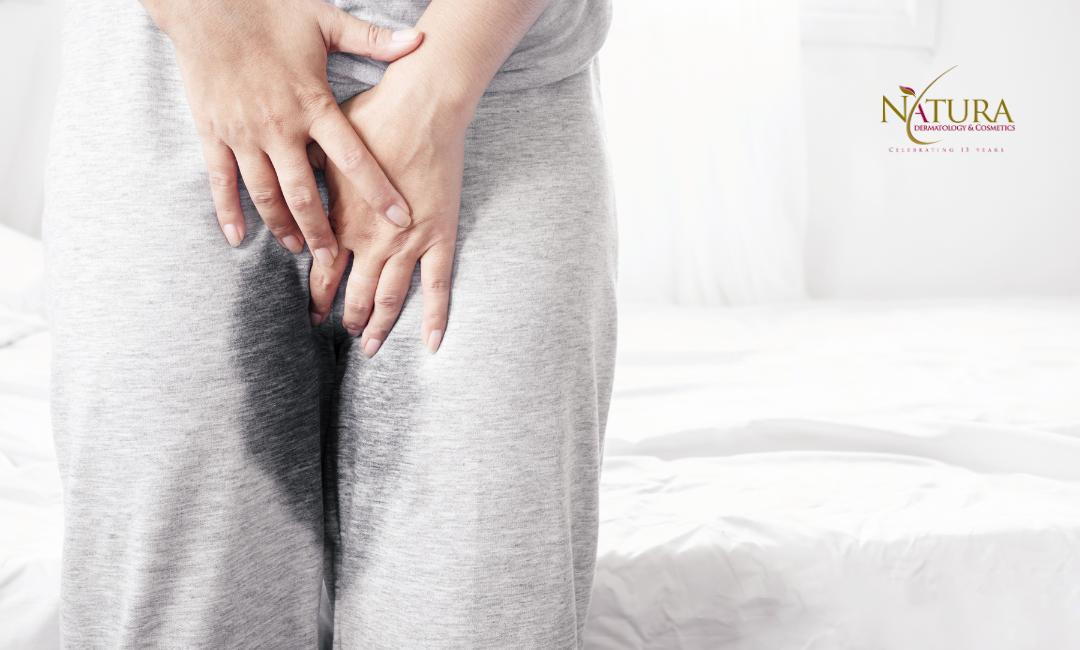Medications That Cause Bowel Incontinence

- posted: Aug. 06, 2024
Ever catch yourself blaming last night's burrito, when the real culprit behind your bowel issues might be lurking in your medicine cabinet? It's not always easy to connect the dots, but certain medications can unexpectedly trigger bowel incontinence.
This guide is your go-to resource for understanding the link between your meds and unexpected leaks. We're diving into:
The Lowdown on Bowel Incontinence: A quick refresher on what it is and why it happens.
Common Medications: We're naming names – the meds known to sometimes cause trouble.
Why It Happens: Getting into the nitty-gritty of how medications can mess with your gut.
What You Can Do: Don't worry. We've got your back with tips for managing and regaining control.
And if you're in the Fort Lauderdale area and want to take charge of your skin health, the experts at Natura Dermatology & Cosmetics can help. They offer a range of services tailored to your unique needs.
Let's get you back to living life with confidence – and without worry.
Bowel Incontinence 101: What It Is & Why It Happens
Let's be real – talking about bowel incontinence isn't exactly a dinner table conversation. But hey, life happens, and sometimes our bodies throw us a curveball. Bowel incontinence, sometimes called fecal incontinence, is the involuntary loss of bowel control. It can range from a little leakage to complete loss of control. You might experience unexpected accidents, from minor leaks to more, um, significant situations.
So, why does it happen?
Several factors can contribute to bowel incontinence, and your medications might be one of them. However, it's important to understand that medications aren't the sole cause. Other culprits include:
Muscle Damage: Think of the muscles that control your bowel movements, like a drawstring on a pair of sweatpants. If those muscles are weakened or damaged (due to childbirth, surgery, or certain conditions), it's harder to keep things "cinched up."
Nerve Damage: Nerves play a crucial role in signaling when it's time to go. Damage to these nerves can disrupt that communication, leading to unexpected leaks. Conditions like diabetes and multiple sclerosis can sometimes cause nerve damage.
Constipation or Diarrhea: Chronic constipation can overstretch your rectum, making it less sensitive to the urge to go. On the flip side, severe or ongoing diarrhea can overwhelm your system and make it tough to hold things in.
Rectal Prolapse: This is when part of your rectum pushes out of your anus. It can interfere with your ability to control bowel movements.
Hemorrhoids: While they're often associated with itching and discomfort, hemorrhoids can also contribute to incontinence, especially if they're large or severe.
This is just a quick overview. Bowel incontinence can be complex, and there are often multiple contributing factors. The key is to identify the cause (or causes) so you and your doctor can develop a treatment plan that works for you.
Common Culprits: Medications Known to Trigger Bowel Incontinence

Now, let's get down to the nitty-gritty. Certain medications have a reputation for stirring up trouble in your gut, potentially leading to bowel incontinence. Here's a rundown of the usual suspects:
Laxatives: We know, it sounds counterintuitive, but laxatives can sometimes cause too much action. They're designed to loosen stool and promote bowel movements, but overuse or certain types can lead to diarrhea and, consequently, incontinence. Laxatives work in different ways, and some are more likely to cause problems than others. For example, stimulant laxatives can be particularly harsh on your digestive system and may increase your risk of incontinence.
Antibiotics: These powerful germ-fighters can disrupt the delicate balance of bacteria in your gut. This imbalance, known as dysbiosis, can lead to diarrhea, a common side effect of antibiotics, which may increase the risk of incontinence. Some antibiotics are more likely to cause gut issues than others. Broad-spectrum antibiotics, which kill a wide range of bacteria, can be particularly disruptive.
Antacids: Some antacids contain magnesium, which can have a laxative effect and contribute to loose stools or diarrhea. The amount of magnesium in antacids varies, so it's important to check the label and talk to your doctor if you're concerned about this side effect.
Blood Pressure Medications: Certain medications used to manage blood pressure, like calcium channel blockers and beta-blockers, can relax muscles throughout your body – including those in your bowel. This relaxation can sometimes make it harder to control bowel movements. Calcium channel blockers work by relaxing the muscles in your blood vessels, which can also affect the muscles in your digestive system. Beta-blockers work by blocking the effects of adrenaline, which can slow down your digestive system.
Antidepressants: Some antidepressants can affect nerve function and may contribute to constipation, which, as we mentioned earlier, can sometimes lead to incontinence. Antidepressants work in different ways, and some are more likely to cause constipation than others. Tricyclic antidepressants and some newer antidepressants, such as serotonin-norepinephrine reuptake inhibitors (SNRIs), are more likely to cause constipation.
Pain Medications: Opioids, commonly used for pain relief, are notorious for causing constipation. Again, this constipation can sometimes trigger the opposite problem – incontinence. Opioids work by binding to opioid receptors in the brain and spinal cord, which can slow down the movement of food through your digestive system. This can lead to constipation and, in some cases, incontinence.
This isn't an exhaustive list, and it's important to remember that not everyone who takes these medications will experience bowel incontinence. It's all about individual reactions and how your body responds.
Pro Tip: Always talk to your doctor or pharmacist about the potential side effects of any medication you're taking. They can help you weigh the risks and benefits and make informed decisions about your treatment.
Why Medications Mess with Your Bowel Control
Think of your gut like a finely tuned orchestra, with each instrument playing its part in perfect harmony. But when certain medications enter the scene, they can throw off the rhythm, leading to some unwanted solos (aka bowel incontinence).
Here's how these meds can cause a ruckus in your gut:
Muscle Relaxers: Certain medications, like those for blood pressure or muscle spasms, can chill out your muscles a little too much. Remember those drawstring sweatpants we mentioned earlier? If the muscles are too relaxed, well, you get the picture.
Nerve Disruptors: Some meds can interfere with the signals that tell your brain when it's time to head to the bathroom. This can lead to either missing the cue altogether or getting a false alarm, resulting in leakage.
Gut Irritants: A few meds can irritate the lining of your intestines, causing inflammation and disrupting normal bowel function. It's like adding a little too much spice to your favorite dish – it might not sit well.
Microbiome Mayhem: Our guts are home to trillions of bacteria that play a crucial role in digestion. Certain medications, like antibiotics, can wipe out these beneficial bacteria, leading to an imbalance that can wreak havoc on your digestive system.
Of course, this isn't an exhaustive list, and not everyone will react the same way to every medication. Our bodies are unique, and what causes one person to experience bowel incontinence might not affect another.
Pro Tip: If you're starting a new medication and notice changes in your bowel habits, don't hesitate to talk to your doctor. They can help you determine if the medication is the culprit and explore alternative options if needed.
Taking Back Control: Your Action Plan for Managing Bowel Incontinence
Don't let bowel incontinence steal your confidence or cramp your style. It's time to take charge and explore your options.
BTL Emsella: Your Tool for Strengthening Pelvic Floor Muscles
If weakened pelvic floor muscles are contributing to your incontinence, you'll be thrilled to know about BTL Emsella. This revolutionary technology uses electromagnetic energy to stimulate your pelvic floor muscles, essentially giving them a workout without you having to lift a finger (or do a single Kegel).
Here's why Emsella is a game-changer.
Non-invasive: No surgery, no downtime. Just sit back and relax while Emsella does its thing.
Effective: Clinical studies have shown significant improvement in incontinence symptoms after just a few sessions.
Convenient: Each session takes about 30 minutes, and you can easily fit them into your busy schedule.
At Natura Dermatology & Cosmetics, we're proud to offer BTL Emsella as a cutting-edge solution for incontinence. Our experienced team can guide you through the process and help you regain control of your bowel function.
Other Steps You Can Take to Manage Bowel Incontinence
Emsella is a great option, but it's not the only one. Here are some other steps you can take to manage your symptoms and improve your quality of life:
Bowel Retraining: This involves setting a regular schedule for bathroom breaks and gradually increasing the time between them. It can help retrain your bowel and improve your control.
Dietary Changes: Certain foods can trigger diarrhea or constipation, which can worsen incontinence. Identifying and avoiding trigger foods can make a big difference. Keep a food diary to track what you eat and when you experience symptoms.
Fiber Up: Adding more fiber to your diet can help regulate your bowel movements and reduce incontinence. Aim for 25-35 grams of fiber per day from sources like fruits, vegetables, whole grains, and legumes.
Pelvic Floor Exercises: Kegel exercises can strengthen the muscles that control your bowel movements. These exercises involve squeezing and relaxing the muscles you use to stop the flow of urine. Your doctor or a physical therapist can teach you the proper technique.
Medications: In some cases, medications can help manage bowel incontinence. These might include antidiarrheal medications, bulking agents, or medications that slow down bowel movements.
Surgery: If other treatments haven't worked, surgery might be an option. The type of surgery depends on the underlying cause of your incontinence.
Managing bowel incontinence is a process, not a sprint. It may take some time to find the right combination of treatments that works for you. Don't get discouraged – stay positive, be patient, and work with your healthcare team to develop a plan that helps you regain control and confidence.
Ready to Reclaim Your Confidence? You've Got This
Dealing with bowel incontinence can be a bummer, but remember, you're not alone. Many people experience this issue due to weakened anal sphincter muscles, inflammatory bowel disease, or other gastrointestinal and liver diseases. Knowledge is your first step towards regaining control of your bowel movements. Armed with the information from this guide, you can start exploring options like bowel training to strengthen your anal muscles and reduce the risk of fecal incontinence, even with solid stool.
Key takeaways:
Bowel incontinence can be triggered by various factors, including certain medications.
Understanding how medications affect your gut can empower you to make informed decisions about your treatment.
BTL Emsella and other strategies offer effective ways to manage incontinence and improve your quality of life.
Take the Next Step with Natura Dermatology & Cosmetics
Ready to explore your options for managing bowel incontinence and reclaiming your confidence? The experts at Natura Dermatology & Cosmetics are here to support you on your journey. We offer personalized treatment plans, including innovative therapies like BTL Emsella, to help you feel your best – inside and out.
FAQs About Bowel Incontinence
What medication causes fecal incontinence?
Several medications can potentially contribute to bowel incontinence, including:
Laxatives: Overuse or certain types can lead to diarrhea and incontinence.
Antibiotics: They can disrupt the gut microbiome and cause diarrhea.
Antacids: Some contain magnesium, which has a laxative effect.
Blood pressure medications: Certain types can relax muscles, including those in the bowel.
Antidepressants: Some can cause constipation, which can paradoxically lead to incontinence.
Pain medications (opioids): These are notorious for causing constipation, which can lead to incontinence.
This isn't an exhaustive list, and it's important to talk to your doctor about the potential side effects of any medications you're taking.
What is the most common cause of bowel incontinence?
The most common causes of fecal incontinence are:
Muscle damage: Weakened or damaged pelvic floor muscles can make it difficult to control bowel movements.
Nerve damage: Conditions like diabetes and multiple sclerosis can damage nerves that control bowel function.
Constipation or diarrhea: Chronic constipation can overstretch the rectum, while severe diarrhea can overwhelm the system.
What over-the-counter medicine is good for bowel incontinence?
Over-the-counter medications for bowel incontinence depend on the underlying cause:
For diarrhea: Loperamide (Imodium) or bismuth subsalicylate (Pepto-Bismol) may help.
For constipation: Fiber supplements like psyllium (Metamucil) or stool softeners may be recommended.
It's crucial to consult with your doctor before taking any over-the-counter medication, as they can help determine the best course of action based on your specific situation.
What vitamin helps with bowel incontinence?
There isn't a specific vitamin that directly treats bowel incontinence. However, maintaining a balanced diet rich in various vitamins and minerals is essential for overall gut health, which can indirectly improve bowel control.
Contact Us
Our Locations
Broward Location
800 E Broward Blvd, Ste 507
Fort Lauderdale, FL, USA
Hours of Operation
8:30 am - 12:00 pm
1:30 pm - 5:00 pm
8:30 am - 12:00 pm
1:30 pm - 5:00 pm
8:30 am - 12:00 pm
1:30 pm - 5:00 pm
8:30 am - 12:00 pm
1:30 pm - 5:00 pm
8:30 am - 12:00 pm
1:30 pm - 5:00 pm
Closed
Closed


